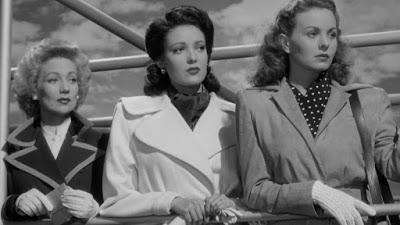Format: Movies! Channel on rockin’ flatscreen.

Since I’ve watched The Great Dictator, the biggest whole in my classic movie knowledge/viewing history is probably A Letter to Three Wives. Naturally, when I saw it on the schedule of one of the several movie channels I have available to me, I recorded it to knock it out. I literally knew nothing about this going in. I didn’t know who was in it, who directed it, or what the basic plot was about. Based on the title, I assumed it was a letter from a man to three former wives about something. Well, I was pretty wrong about that.
Instead, the letter in A Letter to Three Wives actually comes from another woman. In this case, the woman in question is named Addie Ross (an uncredited Celeste Holm), who never appears on camera but narrates the film. Addie, we learn, has just run off with the husband of one of three women in town. All of the women know Addie, who is more or less perfect in the eyes of everyone who knows her. Even more, all of the husbands know Addie as well, and all three revere her greatly. Finally, all three marriages have a particular tension, so the end result is very much in doubt.
We get the story of the three marriages through flashback. The first concerns Deborah (Jeanne Crain) and Bradford Bishop (Jeffrey Lynn). Deborah’s problem is that she doesn’t really feel like she fits in with everyone else. While the husbands, another of the wives, and Addie were all childhood friends, she grew up on a farm apart from everyone else. Worse, everyone had always assumed that Brad would end up marrying Addie. Instead, he met Deborah during the war when she was a WAVE and he was in the Navy. Since Brad has money and a certain amount of class, Deborah constantly feels inferior to everyone around her. And when Brad claims to be going off on business that morning, her insecurity surfaces.
The second marriage is between Rita (Ann Sothern) and George Phipps (Kirk Douglas). Their marital tension is much more a product of the time than it would be now. He is highly educated and works as a school teacher. She, on the other hand, writes radio plays and makes a great deal more money than he does. Bluntly, George feels like less of a man. He’s also disturbed that Rita is constantly giving in to her difficult and unpleasant boss, Mrs. Manleigh (Florence Bates). In her flashback, we see a disastrous dinner party with the Manleighs where she forgot it was George’s birthday and his only gift comes from Addie.
Third is the troubled marriage of Lora Mae (Linda Darnell) and Porter Hollingsway (Paul Douglas). Lora Mae grew up dirt poor. The maid/cook for the Phippses (an uncredited but immediately recognizable Thelma Ritter) is the best friend of her mother (Connie Gilchrist). They live so close to the railroad tracks that the house shakes when a train passes by. Lora Mae wants out, and Porter is one of the wealthiest men in town, so she pursues him. Eventually, she gets him to marry her, but their marriage seems like one based on mutual anger and distrust. They argue constantly, often about the fact that Porter believes Lora Mae married him exclusively for his money.
It’s not worth discussing the conclusion of the film. Suffice it to say that what you think is going to happen at the back of your mind probably does. That’s really the great failing of A Letter to Three Wives. It doesn’t really have the courage of its conviction to ultimately stick the landing the way it needs to. It goes for a much easier way out. That’s a disappointment considering just how well the tension is built through the first two acts of the film and well into the third act. It’s the closing ten minutes that seem to drop the ball. However, in this case, the film has an excuse. While the identity of the husband in question is apparently different in the book (which was called “A Letter to Five Wives”), everything else appears to have been pretty much the same.
And that’s just it—it is a good story, and it’s very well told pretty much all of the way through. Mankiewicz’s job here was to create a great deal of tension from a very simple and interesting premise, and he genuinely does. There is doubt through all of the different reveries about which husband might be walking away, particularly since each of them had been acting strange that morning.
In fact, other than the actual ending, my only real complaint was that Porter Hollingsway looked so much older than everyone else, and that’s actually addressed in the story. He is older than everyone else.
The best thing, though, is that A Letter to Three Wives could have easily become as maudlin and melodramatic as we are led to believe that Rita’s stories are. This could have absolutely dripped with sentiment and glurge, and instead we get real emotions and real people with real problems. That more than anything is what recommends the film. The ending, while it doesn’t quite earn it, would seem to be a problem with the story itself and a function of the time in which it was made. I can forgive the film this, since the rest of it is so solid.
Why to watch A Letter to Three Wives: An interesting take on potential infidelity.
Why not to watch: It doesn’t really earn its ending.
